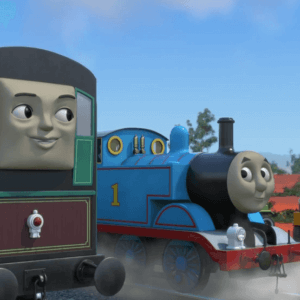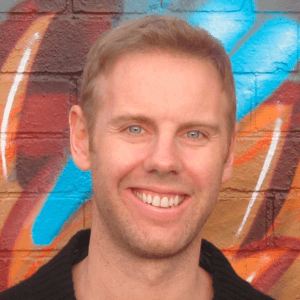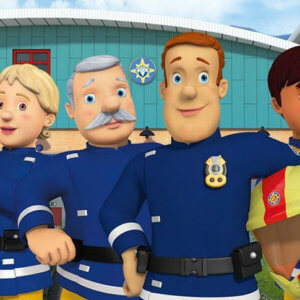How to Write for Kid’s Animation: Tricks of the Trade with Tim Bain – Q&A
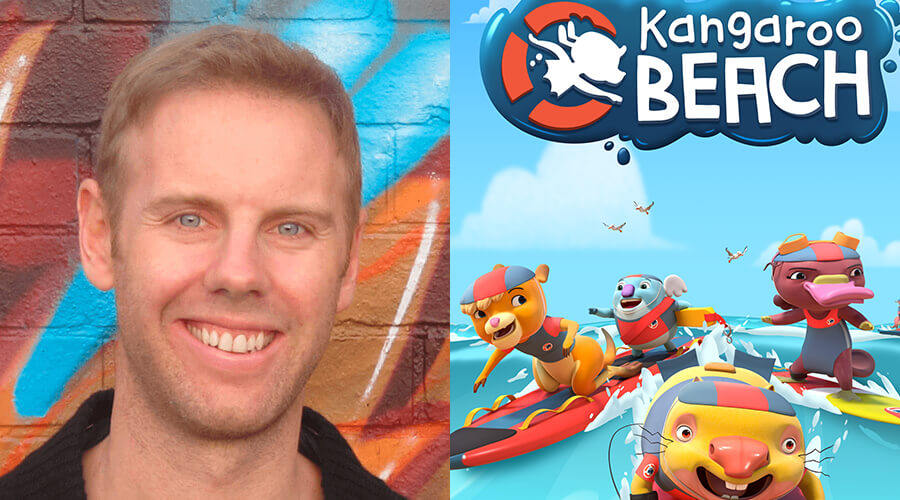
For nearly ten years, Tim Bain has written for some of the biggest and globally popular animated hits within children’s television. His journey led him to work on such acclaimed shows as Go Jetters, Dennis and Gnasher Unleashed, Fireman Sam, Digby Dragon, PJ Masks, Bluey, The Rubbish World of Dave Spud, Thomas & Friends and many more.
We spent an hour talking about his impressive career, how he got started and his tips for any inspiring writers; plus how it felt to work at acclaimed studio Aardman and having created his first series after his hard work.
How did you start your career and how did you get involved with writing for children’s television?
I had a bit of a roundabout career I guess. I was obsessed with animation and cartoons when I was a kid. I saw the Aardman Claymation movies when I was a teenager which just blew me away and got me obsessed with Claymation. I loved the Saturday morning cartoons. I used to draw comic strips with my sister who was my solo audience back then.
I always knew I wanted to work in animation so I did an arts degree followed by a year-long animation degree in which we learnt 2D animation techniques and Claymation. We did animation with sand and glass and we animated with meat products which stunk up the studio after a day under the hot lights. What I found was that I enjoyed the scripting more than the actual animation itself because in Claymation they can fall over and my doodles aren’t that fantastic -, like my drawing skills – but I really love the storytelling aspect of it and I really wanted to make that a career.
But I sort of got distracted in my twenties. I ran a corporate video business and then through a contact I got a job as a comedy writer on a topical news series called Rove which was on once a week which I loved doing, telling jokes for adults on a lot of contemporary views. But my heart was always in animation and I was always working on my own little ideas on the side and I had the opportunity to move to the UK when I was about thirty. The industry over there is quite spectacular, the kids TV industry. They’ve got the BBC, CBeebies and CBBC and Disney, Nickelodeon and Cartoon Network and they make such high quality, world class shows, particularly in animation. I really wanted to get into that and it was hard, because I was a small fish in a very big pond and the TV credits that I had in Australia weren’t for kids and no one really knew the shows I worked on back in Australia.
I went to a comedy writing festival and I met a fellow Australian who was directing kids TV over there and she introduced me to a kid’s producer at the BBC via email. I went and met him and he was developing two shows that he created, one called Numtums and one called Go Jetters and he was looking for a writer to help develop those, to write some scripts to expand the bible and really flesh out those shows. I was lucky enough to hit it off with him and he invited me to some workshops for those shows and then to go and write the pilot script and flesh out the bible. It was developing those shows that kind of got the ball rolling.
Once I had credits I think it was a catch twenty-two when you’re starting out in writing because people want you to have an agent I guess. Producers would like you to have an agent to get some confidence in you, but then agents want you to have a credit on a TV show before they’ll hire you. What’s the first step? I was lucky enough through that process that I was able to meet this fabulous producer, Barry Quinn, and his faith in me led to working on those shows and then securing an agent in the UK, which then gave other producers confidence to hire me on their shows.
Some of your writing seems to focus on comedy like The Rubbish World of Dave Spud and Strange Chores. What are the challenges involved with writing comedy and trying to get 6 to 12 year olds to laugh?
That’s a great question because sometimes kids TV can be looked down upon as not as clever and as smart as comedy aimed at adults, but in actual fact it can as I’ve written comedies for adults as I mentioned. It can be tricky writing for younger and younger audiences and I think it can get harder and harder the younger you go, because you’re looking for all these comic buttons on things and jokes, but the line that you can cross gets lower and lower the lower the age group of the audience.
You have to find clever ways to entertain an eleven year old whose quite sophisticated and possibly watching shows like Rick and Morty and Family Guy, but you have to write for them within the boundaries of that age group. There’s definitely a trick to it. I could remember a lot of my own experience as a kid and embarrassments that I had or things I loved doing, jokes that my friends would tell what I found funny back then and it’s drawing on those memories and bringing those into scripts that hopefully will relate to an eleven year old in 2020.
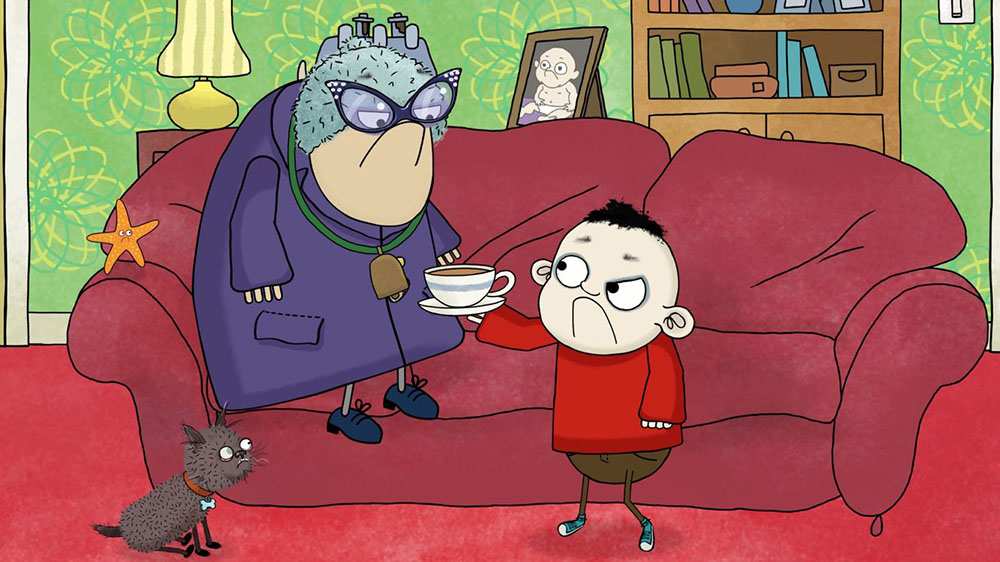
The Rubbish World of Dave Spud
You seem very attached to animated shows as a writer. What is it about animation that appeals to you personally?
I think it’s this almost magical moment of an inanimate object or piece of clay coming to life. It’s marrying that actor’s voice to the animator’s beautiful animation and then suddenly it sparks a character that feels real. So that’s really exciting for me because as I mentioned before Aardman was a huge influence when I was a kid and I saw Wallace & Gromit and a variety of their short films and Chicken Run when that came out and I had the luck recently to be writing for a series of Morph, a classic Aardman character. It’s exciting to be writing stories about the journey that Morph goes through and there’s slapstick you can have with him, see all of this beautiful animation from the talented animators at Aardman bring these pieces of clay to life and imbued them with emotion and bring those stories to life.
You’ve written content for a wide range of audiences, from pre-school to adults. Which age groups do you personally prefer to write for and why?
I love writing for all of them. There’s very different jokes you tell with those different characters and different categories, whether it’s preschool or six to elevens or adults. I love being able, in any given week, to work on a variety of shows for a variety of different audiences and be back and fourth in-between.
I love writing stories and getting ideas down – you put a lot of heart and empathy into the shows at the [pre-school] age group which I love doing, but I honestly love writing for six to elevens because you’re really pushing that line to get away with jokes that you wouldn’t do for younger kids. Like the Rubbish World of Dave Spud, I’m surprised how far we pushed the envelope on that show. It’s been a push on the barrier on what you can get away with that’s loads of fun for that audience. But I love writing for adults because they are my contemporaries and if I can write jokes about stuff that’s happening in the news and vent at politicians or whoever that’s really rewarding as well.
We recently interviewed the animation director for Love Monster and she said that the premise of the series is “to work out everyday problems that hopefully will be reflective of concepts children might encounter – like sharing with other people, or things they might be scared of.” With this, or any other pre-school series you have worked on, what approach do you do to make sure the episodes can be relatable to young audiences?
I wrote a few episodes of Love Monster and that was a lovely shows to do because you’re really focusing on a character’s inner most emotions as he went through each day.
I think it’s that I’m lucky enough to have my three year old twins and understand what their perspective of the world is and how they’re learning every day. Their mind is being blown by the brand new things they are discovering, so when I’m writing for young audiences it’s thinking about the roller coaster that life is. They can spin between different emotions from one second to the next, they can be joyously happy and then terrified the next or screaming about something that’s not fair. It’s trying to see the world through their eyes so I’m developing my own show at the moment which is about three different families with different family dynamics like a family with two gay dads and trying to feel how a child experiences that kind of family and the joys and downfalls of everyday life I guess.
I think it’s also about really putting kids up front and centre in your stories so adults definitely take a back seat. It’s about kids seeking fun or making friendships or all the emotional things they experience in any given day.
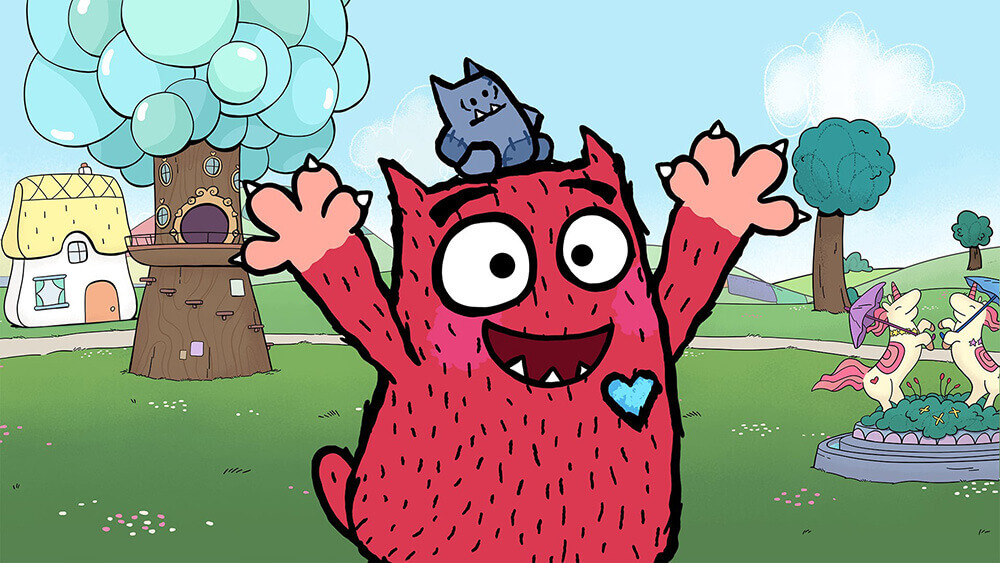
Love Monster
As you are also someone who has written television bibles and pilot scripts, what are your key tips for anyone who is looking to break into writing for animation?
You start by cutting your teeth by writing for other shows and that’s certainly how I learnt the trade. I went out there when I was younger, trying to pitch my own shows and get those up and happening first, but I think what was most admirable going to write for other shows. The first preschool show I was hired on was Fireman Sam and I learnt so much from the wonderful head writers Laura Beaumont and Paul Larson, who have been head writers for a few series, and knew the characters so well and the situations Sam and the kids could get up to on that show and guide me through. I would have story ideas that help me shape those stories into something that felt very much like a Fireman Sam story. It was like a personal class with two wonderful teachers.
For a start, I would suggest to try to get hired as a writer on shows that you love. How do you do that? It’s a very good question because as I was saying before producers would like you to have an agent or see prior credits. What I would recommend is you definitely take that baby, that series concept you got, on your own. Write a bible, look at other bibles if you can, any writers that you look up to who you can email and ask if they can share any of their own bibles.
And then flesh out your own pilot script based on that bible and I would thoroughly recommend spending the money on a script editor. There’s so many fantastic script editors available for hire you can find very easily online. Look for a script editor who’ve worked on productions of TV that you admire and pay them to guide you through all the steps in that script and the bible. But by working with a script editor you’ve got someone who’s very experienced guiding you through it, helping you shape the script to the best possible script it can be along with your bible. Then you’ve got something that you can for one, certainly pitch, but you might have a bit of trouble getting it up and running without having experience writing for other shows. Secondly, you can use that script as your sample, and that is something anyone is going to hire you will often want to see. If you don’t have an amazing CV with credits, use that sample as your calling card to show the quality of your writing. That sample is going to be your business card, it’s going to be a strong way to sell yourself so if you don’t have credits, I highly recommend emailing and introducing yourself. And hopefully if they are good people and they got time, they will give you a shot and if that script grabs their attention and impresses them, they might give you the opportunity to perhaps let you pitch ideas for episodes or invite you to a workshop on a round-table with writers at the start of a series, but that’s definitely the way to get the ball rolling with your very own script. I think the very best example of your work is your original idea fleshed out into a script.
One of the companies I would like to know what they were like to write for are Aardman. What was it like to have worked with such a massive name in children’s media?
It was an absolute dream come true. Going into Aardman in Bristol was a pinch myself moment. I’ve been there a couple of times now and working with my heroes. I was hired on The Epic Adventures of Morph and it’s a series of five minute episodes about the famous, classic character Moprh and because of my experience growing up watching Wallace & Gromit and Morph and movies like Chicken Run and Wallace & Gromit: Curse of the Were-Rabbit, I was quite obsessed.
I got to work with a producer named Sarah Cox who’s a brilliant producer at Aardman and I got to know her from the CMC (Children’s Media Conference), I think I met her a few years ago and we got on really well and she invited me to come in and I met Peter Lord, who’s one of the three founders of Aardman along with Nick Park and David Sproxton. Morph is Peter’s baby and it was amazing. I went in there to pitch this idea and he was very excited about the idea. It was working with him and Sarah in person and a bunch of Skype sessions along the way that I ended up writing six episodes for that series, which is about to premier soon on Sky. It was a dream come true. I couldn’t believe it. It was a career goal I had for twenty years to write for them and now it’s so exciting to know that right now in a studio at Aardman there’s heaps of incredibly talented animators taking my script and breathing life into it. This series, I feel like we really got to push the boundaries of Morph and explore his world.
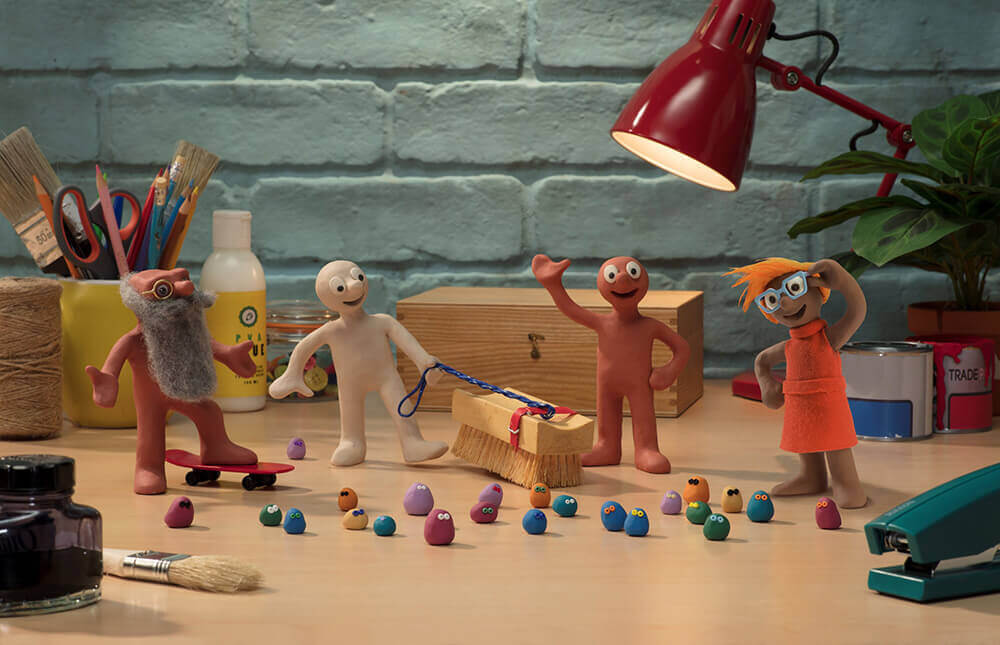
Morph
As well as having written for Thomas & Friends, you have also voiced for one of the characters, Aiden. How did you get involved with voice acting and were you able to use this unique position to help with writing for the show?
When I was a kid I wanted to be an actor and unfortunately I realised in a school musical I didn’t quite have the acting chops. I was probably a bit too much of an exaggerated actor, but I think that my over the top sort of attitude worked well for animation where you’re encouraged to dial up the volume to eleven.
When I was writing for Go Jetters, the episode I wrote about the Sydney Opera House, there was this yacht commentator character that I thought I wouldn’t mind playing him. I was basically making an offer to the producers to come in and voice this character and they said yes. So I got in there and I got to work with the cast in the studio. The cast were much more talented than me and I needed many more takes to get my lines right. The director had to put me through my paces, but I got a kick out of seeing an animated character with my own voice coming out of his mouth. That’s quite exciting.
When Thomas & Friends came along, I was hired to write some episodes set in Australia where Thomas visits Australia, travels around and has adventures. There was a couple of characters; there was Shane the train and his rear carriages, Aidan and Audrey, and I reached out to the producers and said “Hey, are you interested in me trying out some voices?” They said sure go ahead and so I recorded some on my phone and I sent them in and they liked them enough to say come in and record in the studio. It’s a lot of fun and makes you see a production of a show in a whole new angle and realise how tricky dialogue can be to say sometimes.
Dialogue can be clunky and hard to get your mouth right sometimes. Now it’s made me read my scripts out loud before I send them off, knowing an actor is going to bring my scripts to life and make it sound like credible dialogue. It was a lot of fun to get out from behind the desk and step into a booth and work with a director to bring a character to life in a whole new perspective.
- Thomas and Friends
- Tim Bain
- Fireman Sam
Are there any shows that you would have liked to write for and if so, what were those titles?
Many shows. Back in the day I was very new, but I had a chance to go to a writer’s workshop on The Amazing World of Gumball, which is just a brilliant show. I was so new to that world and it was nice to spend time on the table for a few days. I got a joke or two in one of the episodes, but I didn’t end up staying on to write for the show. Looking back, I would love to apply to that show with more experience that I have now.
Aardman was definitely the one I wanted to write for and had that opportunity recently. I would still love to write for Shaun the Sheep one day, and Wallace & Gromit if ever the opportunity came again.
Feature film is the next point I’m really keen to get into. It’s just a whole other format. You’re trying to tell a story to engage an audience and keep them excited for ninety minutes. The shows I usually write are mainly eleven to twenty two minutes long. I think that would be a really exciting challenge, particularly to tell stories on a big screen with a bigger budget and I just need to find the time to sit down and start coming up with my own feature film ideas. If a producer ever came along with an idea in the works, I’d love to be working on that as a freelancer; a writer for hire.
As a parent and a writer, what was it like to have written for Bluey and put your own experience in a successful Australian production?
I was very chuffed to write that episode (Mount Mumanddad). It was co-written with Joe Brumm, who wrote a majority of Bluey episodes and is the creator, and he’s absolutely brilliant. When I read the bible and read the scripts and watched the pilot they sent me during the start of production it just blew me away. Like you, I just thought “What is this amazing show?”
The comedy is so relatable if you’re a kid or a parent, every episode is full of relatable hilarity. But it’s also got this amazing heart to it where characters have this discovery at some crucial point in the episode where it resolves a problem they might have and have this really heart-warming resolution. It’s just a mix of all those different elements that you can understand why it’s so hugely popular.
There’s just so many relatable situations that come from raising kids and how funny it is and how stressful it can be sometimes and all the games that you play and that’s in the heart of every Bluey episode. I didn’t have that relatability to six year old Bluey and four year old Bingo, but what I did have was memories from my own childhood. The episode I came up with was called Mount Mumanddad, which was based on my experience using my dad as a mountain when I was young and how amazing it was to be small in size and have this huge parent you can climb all over.
So I drew on experience from my own childhood.
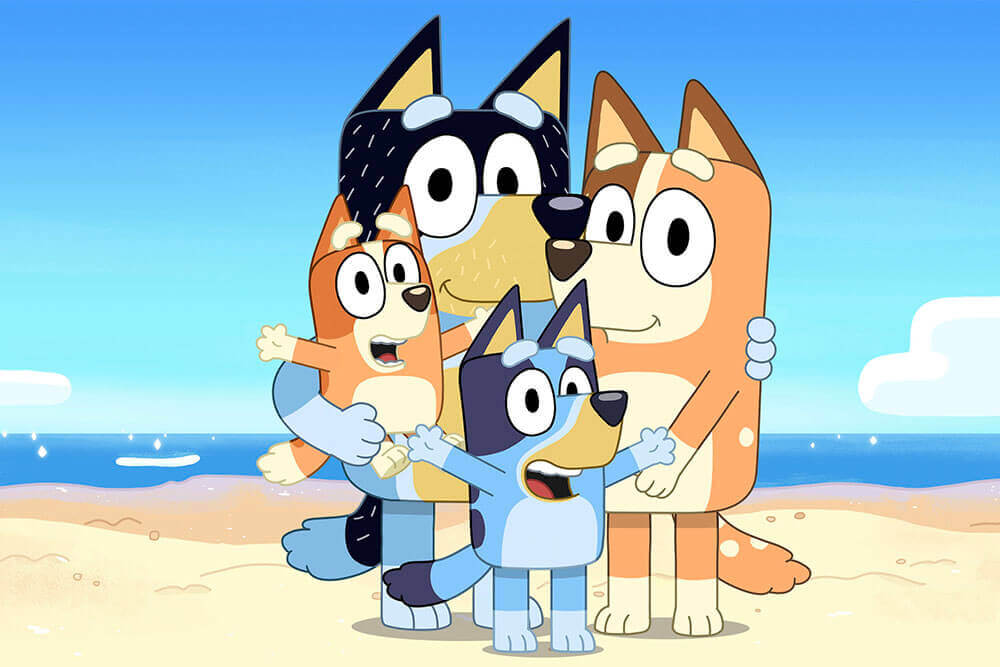
Bluey
What are you currently working on?
I’m quite lucky to have my first series Kangaroo Beach commissioned a year or so ago by ABC Kids and we’re well into production of that now. It’s an animated preschool CGI action comedy show and it’s set in a world of lifesaving or life-guarding. I was a little Nipper when I was a kid, which was like a junior lifeguard in Australia where you learn all about water safety, how to rescue people and we play beach sports. It was a lot of fun. My dad was a lifesaver when he was younger.
It came from this idea that kid’s love the beach and they love the swimming pool and there’s no shows out there on TV that are primarily set in that world, but at the same time there’s also danger involved with water. It’s one of the highest risks of death for children and it’s like an education for both kids, and more importantly, their parents. It’s never been explored before in a kids show.
Being an Australian I thought some of the best beaches are in Australia. I’ll set it in Australia and use Australian animals, but ones that live on the beach where a majority of Australians live. So the lifeguards in the show are all kangaroos. Kangaroos are great swimmers and fast on land so they’re perfect for lifeguarding. The cadets, who are the kid characters in the show, they’re learning the ropes from the kangaroo lifeguards and spending a summer at Kangaroo Beach.
That’s hopefully coming out at the end of this year on TV and it’s been a really rewarding process. It’s the first time I’ve created a show that’s going to be on TV and it’s working with a very talented team of producers and actors, incredibly talented designers and animators and other writers bringing the show to life. It’s been a real thrill.
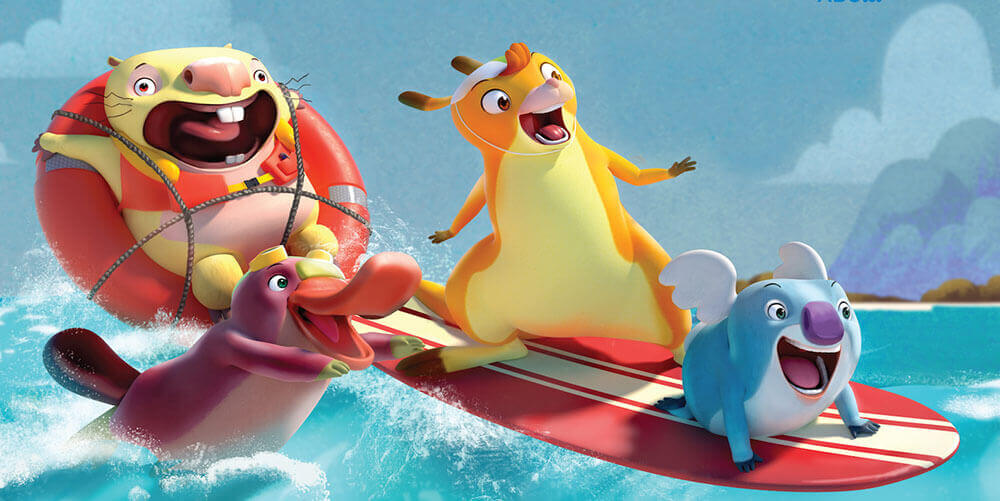
Kangaroo Beach


